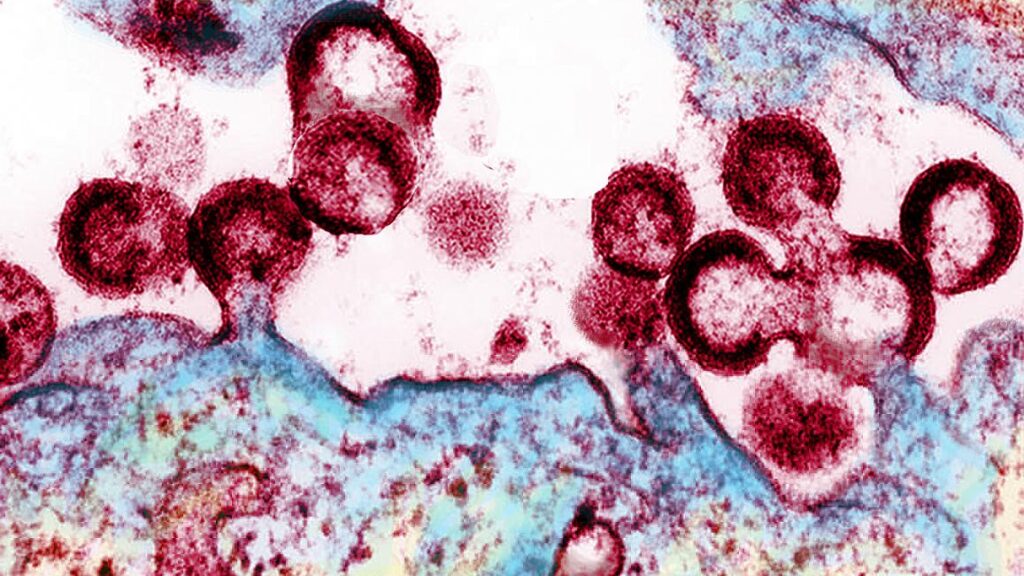When children living with HIV are injected with neutralizing antibodies, the treatment can suppress cells that contain the virus and are capable of reactivating, an early-stage trial found.
Details of the trial, documented in a study published Wednesday in Science Translational Medicine, show that broadly neutralizing antibodies can boost the protective effects of antiretroviral drugs. This suggests that antibody drugs can be used as supplements or even as alternative treatments for HIV in children.
“It was a very clear proof of concept that we can be able to use broadly neutralizing antibodies as an alternative therapy,” said study lead Roger Shapiro, a professor of immunology and infectious diseases at Harvard University’s T.H. Chan School of Public Health.
The trial was conducted in children living with HIV in Botswana. It is the first time that broadly neutralizing antibodies have been tested — in combination with antiretroviral drugs — against HIV in a pediatric population. “The takeaway from this study is that it’s feasible,” said Ann Chahroudi, an associate professor of pediatrics at Emory University School of Medicine, who was not involved with the study.
Although researchers have administered neutralizing antibodies to treat HIV in patients in recent years, their focus has been on adults living with the infection. Chahroudi said the new trial is significant and showed that children are ideal candidates to benefit from combinations of neutralizing antibody treatments.
Worldwide, about 1.7 million infants and children are living with HIV. Children with HIV have to be prescribed months of daily, lifesaving antiretroviral treatments. But taking the medications can be complicated for a host of reasons. Pediatric formulations can be in short supply. Caregivers of children on antiretroviral therapy often struggle to prepare and administer the drugs effectively. And they face challenges, such as financial burdens caused by transportation costs needed to receive the drugs at hospitals and comply with follow-up.
Neutralizing antibodies may offer a new approach to addressing the challenges of HIV treatment, especially in children.
Shapiro and researchers at the Botswana Harvard AIDS Institute Partnership recruited 25 children with HIV who have been taking antiretroviral therapy from birth. They injected the children with monthly doses of two neutralizing antibodies, known as VRC01LS and 10-1074. After eight weeks, the researchers stopped the antiviral treatments, but they continued administering the antibody drug cocktail for 24 weeks.
Among the 25 infants, 11 continued to suppress the virus in the absence of the antiretroviral medications. “It turned out that nearly half of the kids were able to suppress the virus,” Shapiro said.
The researchers then conducted genomic tests to measure the amount of HIV in blood samples collected from the children. They found that the children had lower viral loads in their DNA and smaller viral reservoirs in their immune cells. This means that children with HIV who receive the neutralizing antibodies are more likely to live healthy lives. The findings are similar to those in studies conducted in adults living with HIV.
The study was limited by its small size and thus may not be representative of other children with HIV in general, the researchers said. Children already on antiviral treatments also have low viral reservoirs — where the virus hides and can reactivate — which makes it difficult for researchers to measure. “It was very difficult for us to measure impact on the [viral] reservoir to a greater extent,” Shapiro said.
Shapiro told STAT that researchers are currently enrolling all the children in long-term trials for in-depth profiling of viral reservoir cells and immune responses.
Although antibodies have been used for treatment of conditions including Covid-19, they are costly to manufacture. And administering the neutralizing antibodies in children living with HIV wouldn’t be an easy task. This would particularly be the case in low-income countries, where the burden of the disease is highest.
But Shapiro is hopeful. “Research has to start from somewhere,” he said. “We’re at the very beginning to understand what’s biologically possible in the near future even though it appears to be an expensive, logistically challenging strategy.”


